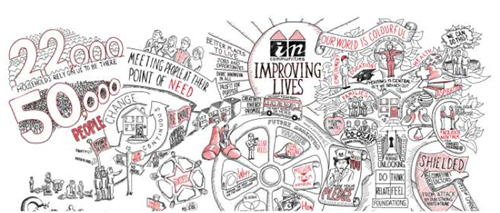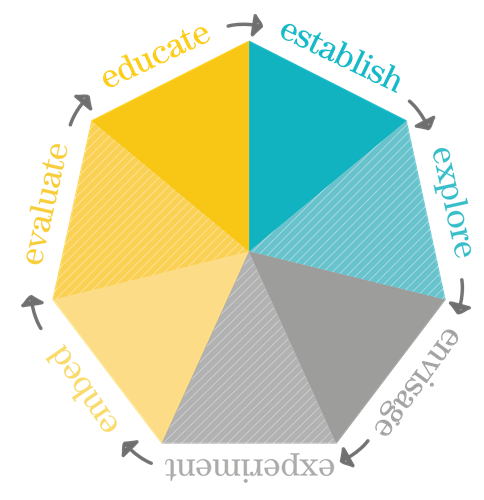Recently, I have been struck with the famous saying by the late and globally revered management and organisational development expert Peter Drucker – ‘Culture eats strategy for breakfast.’ At ICE, our clients often ask us to support the development of leaders’ capability, as well as supporting teams to be more effective, and to implement new ways of working. Once we understand the initial presenting problems or requirements, we then start to explore the organisational culture – essential in ensuring that all organisational change is effective and sustained.
After a long intake of breath and a slow sigh, more often than not, leaders will then start to describe a reality that is very different from the values that are proudly displayed on their walls and banners. We come across situations where there are legacies of previous organisations, which are integrated only in name. Often, staff will still describe belonging to one tribe or the other. Other common situations include a lack of confidence to act, with staff referring-up and permission seeking for fear of ‘getting it wrong’, managers describing a lack of accountability and staff speaking of forever changing goalposts, staff not feeling safe to speak out when there are serious problems. Without the security to speak up safely, serious problems that are affecting staff, customers or patients – that are not right and should not be tolerated – can lay dormant until they manifest in disastrous ways. You may recognise some of these situations in your own organisation or team.
We work with managers, leaders and organisations to be able to safely and clearly describe what is going on with their culture, to find a common language to describe and value the different perspectives that create the culture, and to envisage in a practical way what the desired future culture could and should be. This co-creation process - engaging and involving a wide range of staff groups, including those who may be finding the culture most challenging - helps to develop commitment and ownership in shaping a different future. By exploring what is needed, what is getting in the way, current behaviours and the behaviours that are required, we are then able to begin developing a cultural road map. This map includes milestones that people will be able to measure progress against, as well as the resources that will be required, or obstacles or roadblocks that need to be overcome. This can be described in a written report, but using facilitated graphic visualisation means that the image created gives everyone a clear road map; they can check, hold others to account and measure their own personal culture change in line with their map.

Energy for change is key, both at personal and organisational levels. People often notice energy by its absence, where people may be willing, prepared to commit to doing things differently, but describe ‘not having capacity or bandwidth’ to engage, feeling exhausted or burnt out, or where people for whatever reason do not want to engage, full stop! For some, they are more preoccupied with survival, dealing with challenging rather than functional relationships and uncertainly in their self-esteem each day. This lack of energy or deficit inevitably gets in the way, stopping people being able to engage in thinking about ‘doing things differently’ or organisational transformation.
Being able to measure available energy at personal, team and organisational level helps to ‘name it’ in an objective way – one which enables the safe conversations including ‘what do we need to do next to address and support a positive culture?’ To enable this, we use a simple and effective tool – Culture Map. Developed based on Barrett's work on levels of consciousness, Culture Map takes less than 10 minutes to complete. It asks 3 questions, choosing 10 words to best describe three scenarios – your personal preferences, your current experienced culture and your desired future culture. Each of the chosen words translates to an energy level, and helps to quickly pinpoint where energy is within individuals. There may be limiting or negative energy or entropy that gets in the way of change, or there may be higher level positive energy, with less energy deficit creating a more positive environment for change – both at personal and organisational levels.
Understanding the energy - both negative and positive - at a granular level enables and opens up a different conversation about ‘what we need to do to address, support and enable change.’ It pinpoints and identifies specific issues, enabling more targeted and impactful interventions. When combined with the future culture road map, this creates engagement and ownership with staff, teams, managers and leaders and clear direction.
It is often said that ‘Cultural change is a journey’ - often long and demanding, full of surprises and unexpected twists and turns. In our ‘real lives’, we wouldn’t set out on a journey without having some sense of our destination, and possible options on routes (even if reliant on Sat Nav and Google Maps!), and we would know why we were venturing out and the benefits of travelling, if only to see our world from a different place.
Surely then, it is vital that when leading our people and organisations through cultural change, we must be equipped with a known or co-created destination. We must always understand ‘why’ and ‘what’ we want to be different as a result of any change, and we must have the stamina and energy to sustain the trip – with surplus energy created to enjoy the change along the way!
So it is true, culture does eat strategy for breakfast – make sure you have had your breakfast!
As behavioural change specialists, we work with a number of NHS organisations, local authorities and place-based systems and organisations to support organisational and culture change. If you would like to know more about what makes the difference and how ICE can help your organisational and culture change to be relevant, effective and sustained, please do get in touch with me on 0794 1289 999
We’d be happy to share the insight from our experience and understand what matters to you. Our approach is innovative, engaging, evidence-based and effective. You will feel like you’ve had 3 Wheetabix - energised and equipped to lead your cultural change journey.
- Jane Cryer
 collective voice
collective voice

